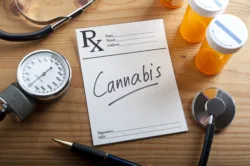Evaluating the Benefits and Risks of Medical Marijuana in Pennsylvania

In recent years, the discourse surrounding medical marijuana has undergone a significant shift, especially in states like Pennsylvania. With the legalization of medical cannabis, there has been a surge of interest and debate regarding its use, efficacy and potential risks. One of the most prevalent concerns is whether medical marijuana is addictive. In this blog, we explore the landscape of medical marijuana in Pennsylvania.
Medical Marijuana in PA: A Brief Overview
In 2016, Pennsylvania joined a growing number of U.S. states that have voted to legalize medical marijuana, recognizing its therapeutic potential. The Medical Marijuana Program in PA allows patients with qualifying conditions to access cannabis for medicinal use under the supervision of a registered physician. This decision aimed to provide relief for individuals suffering from various ailments, including chronic pain, epilepsy, PTSD, cancer and more.
Exploring Medical Marijuana Addiction
There are many fears and misconceptions around the issue of addiction. Let’s go over the distinction between dependence and addiction. Dependence refers to the body’s adaptation to the presence of a substance, leading to withdrawal symptoms upon discontinuation. Addiction, on the other hand, involves compulsive drug-seeking behavior despite negative consequences.
Studies on Medical Marijuana Use and Addiction
Studies evaluating the addictive potential of medical marijuana have yielded mixed findings. Some research suggests that a small percentage of individuals may develop problematic use patterns. Other studies have found medical marijuana users to be at a relatively low risk of addiction, compared to those who use substances like opioids or alcohol. Additionally, factors such as dosage, frequency of use and individual susceptibility all play crucial roles in determining the likelihood of addiction.
Addressing Concerns: Is Medical Marijuana Addictive?
Overall, the consensus among most medical professionals is that medical marijuana is less addictive than many prescription medications commonly used to manage pain and other symptoms of health conditions. In many cases, the therapeutic benefits of medical marijuana may outweigh the potential risks. However, as with any medication, responsible use and monitoring are necessary to mitigate any adverse effects.
Regulation and Oversight in Pennsylvania
Pennsylvania’s Medical Marijuana Program intends to prioritize patient safety and regulatory oversight through strict guidelines for patient eligibility, physician registration, product testing and dispensary operations. By implementing these rigorous standards, the state aims to ensure that medical marijuana is accessed and utilized responsibly, minimizing the potential for abuse or addiction.
The Role of Education and Awareness
Education plays a vital role in dispelling myths and fostering informed decision-making regarding medical marijuana use. Patients, healthcare providers and the overall population need access to accurate information about its benefits, risks and proper usage. By promoting awareness and providing resources, states can provide tools needed for individuals to make well-informed choices regarding their healthcare.
Promoting Alternative Therapies and Holistic Approaches
While medical marijuana offers relief for many patients, it’s essential to recognize that it’s not the only option available. Pennsylvania’s Medical Marijuana Program encourages a comprehensive approach to healthcare, incorporating alternative therapies and holistic practices alongside conventional treatments. By exploring diverse modalities, patients can tailor their treatment plans to best suit their needs and preferences.
Encouraging Informed Decision-Making
The landscape of medical marijuana in Pennsylvania reflects a nuanced approach to healthcare, balancing patient access with regulatory oversight and public safety. While concerns about addiction persist, evidence suggests that the risk associated with medical marijuana is relatively low compared to other substances. Through education, regulation and a commitment to patient well-being, Pennsylvania continues to navigate the evolving terrain of medical marijuana, empowering individuals to make informed decisions about their health and wellness.








